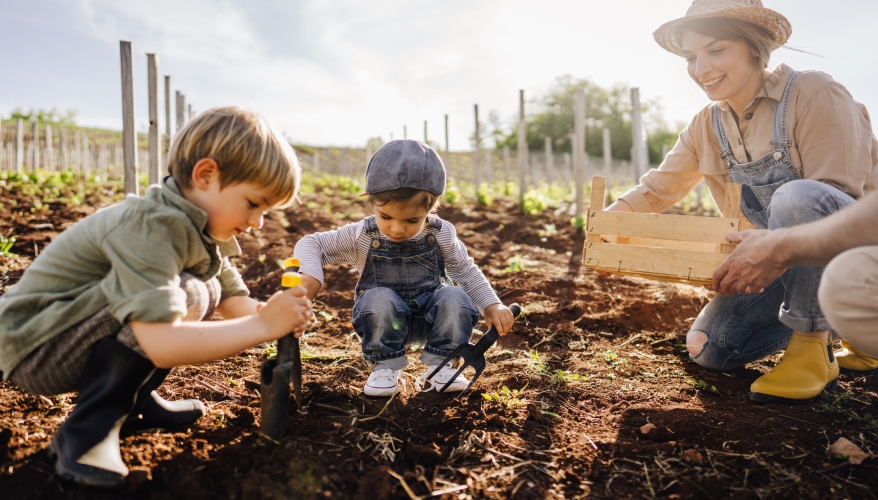Our awareness of the environment and appreciation for our planet has been somewhat of a gradual journey to full bloom. Most of us adults are now keenly aware of the damage that, let’s face it, we and previous generations have caused. It is therefore crucial that we engage in effective ways in which to educate our children, who will after all be the ones to reap our leftovers. Just ask Greta Thunberg. It’s never too early to start encouraging little ones to have an affinity with nature and it can begin with simply having an awareness for what can be coined the classical elements – water, earth, air and fire.
The concept of the classical elements is thought to have originated in pre-Socratic philosophy. Ancient Greeks believed that everything within our environment could be classified as being comprised of either water, earth, air or fire. The theory of the four elements accounting for all matter was sustained for some two thousand years and influenced philosophers and scientists alike. Hippocrates even suggested that the elements could be connected to four humors in the body, which when in balance, were essential for optimum physical and mental health.
MIND OVER MATTER
The importance the ancient Greeks placed in the need for a healthy mind as well as a healthy body is still relevant today. We are constantly learning more from practitioners about the importance of taking care of mental health, and there are an increasing number of honest and empowering messages from those in the public eye who have courageously come forward to share their own experiences. After the turbulence of the pandemic and its many challenges, mental health is something we can all do with keeping on top of, and incorporating meditation and mindfulness is a prime example of something we can all do to benefit the mind.
Many historians suggest meditation dates to around 3,000 BCE, although there are those who think it dates back even further to over five thousand years ago. Greek philosophy which was once based on the four elements has a connection with the teaching of meditation. Each of the so called four classical elements was thought to have a connection to either the physical, mental or spiritual human condition. Water was linked to the soul, while earth related to physical care. Air dealt with the mind, whereas fire correlated to inspiration and healing. Mediation focuses on the body, mind and soul, and some research has suggested that the practising of it may assist in managing symptoms of certain physical conditions. It is also frequently associated with helping alleviate stress, may lead to greater levels of self-awareness, and instil a calming influence.
Mindfulness is something which many of us are familiar with these days – the benefits to the mind and body are well documented, and there are a multitude of books and websites at our disposal. Even children can benefit from simple mindfulness exercises, such as focusing on their breathing and being conscious of their feelings and experiences in a single moment. It’s about taking the time to simply slow down, encompass gentle, thoughtful movements, and paying attention to the present. Aside from possible health benefits, mindfulness is something which can aid with concentration and could even help those temper tantrums melt away – parents and carers take note! Mindfulness is something which anyone can do, costs nothing and only takes a few minutes.
INVOLVING THE SENSES
Sensory experiences are invaluable for youngsters and what could be more sensory than exploring the natural world? When children are out and about, encourage them to notice the climate and weather. Ask them how it feels on their skin – can they feel the tingle of raindrops on their hand, the numbness of the winter chill, the glow of the sunlight (post sunscreen, of course)? Ask whether they can hear the varying sounds of nature – the howl of the wind, the whisper of a breeze, the silence of snowflakes? What does running barefoot in the grass and squelching in the mud feel like? If we all take a moment to just slow down and notice more of our surroundings then perhaps, we will start to appreciate just how beautiful and valuable our natural world is and start to see this respect translate into more eco-friendly actions. Now ask yourself, when was the last time you did any of the above?
A MATTER OF RESPECT
Whilst much of the ancient Greeks’ beliefs are no longer considered true, and modern science now acknowledges the presence of atoms, molecules and many different chemical elements, the significant contribution that Hippocrates and his peers made to medical science is still recognised and respected today. Thanks in no small part to their logical approach and ever curious nature, they ensured that the field was taken far more seriously than it had previously been and was no longer only for philosophers and the superstitious. Hippocrates is still considered to be the ‘father of western medicine’ and those in the medical profession continue to take the Hippocratic oath to this day.
Our understanding of science and the natural world has clearly expanded considerably since the times of the Ancient Greeks and their contemporaries. However, we can still take inspiration from them and utilise their message – that of respect. By choosing to embrace the world around us, we respect both the environment and ultimately each other.
RESOURCES
Websites:
www.mindful.org
www.headspace.com
Books:
‘Crab and Whale’, by Mark Pallis and Christiane Kerr
‘Elmer’s Walk’, by David McKee
‘Breathing Is My Superpower’, by Alicia Ortego
‘A Stroll Through the Seasons’, by Kay Barnham
Clothing/Accessories:
Raincoats, wellies, hats and gloves: www.polarnopyret.co.uk
Sundresses, shorts and sunhats: www.littlegreenradicals.co.uk
Organic Children Scent Free Sun Cream (plant-based packaging): www.greenpeople.co.uk
Lisa Skelcher lives in Lancaster with her husband and their 2 ½ year old daughter. “After graduating with a degree in English Literature, I worked in the insurance sector. I’m currently a stay-at-home mum, and it’s a privilege being a mummy. I find mindfulness relaxing, and favour the natural, non-invasive methodology.”






